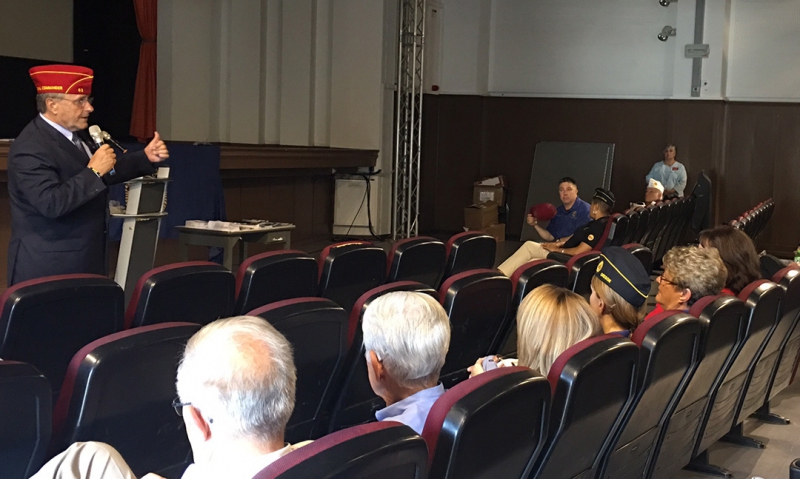
Legion meeting with troops, veterans and their families overseas in Europe to help spread the word about VA benefits and resources available for the military community.
American Legion National Commander Charles E. Schmidt, staff from the Legion's Indianapolis and Washington office, and Auxiliary and the Sons of The American Legion leadership conducted the first of several town halls to members of the U.S. military community in Europe on May 30.
“We were founded by the doughboys of World War I who were concerned about who was going to take care of their buddies after the war. They were concerned about the widows and orphans. They were concerned about the jobs that they left behind in order to fight the war. If it sounds like some of the same concerns facing our Iraq and Afghanistan veterans, you’re right,” said Schmidt to dozens of veterans, active-duty soldiers and family members gathered at the U.S. Army Garrison, Wiesbaden, Germany. “That’s why The American Legion is here. We’re here to listen to your concerns and to let you know about The American Legion and what we have to offer.”
While discussions about Veterans Affairs disability claims, health care and TRICARE dominated the forum, a lack of communication by VA representatives seemed to be the top criticism attendees had at the town hall. Schmidt has publicly said several times that “The American Legion and VA are friends, but friends are honest with friends. When VA is not serving veterans properly, we will say so.”
American Legion Executive Director Verna Jones echoed that sentiment.
“We have to be able to hear the good and the bad about VA, so we can go back to the VA, Congress and the president and tell them what needs to be fixed,” Jones said.
The challenges faced by family members of those serving was a chief concern cited by Auxiliary National President Mary Davis.
“What happens to those family members at home?” Davis asked. “That’s what The American Legion Auxiliary is all about. How can we take care of veterans when they come back? Volunteering at VA hospitals, working in our communities … there are so many things that we can do and that we already do to help our veterans. We hope one day, even today, you will consider joining our ranks. The more individuals that we have helping us, the more strong we are in terms of what we can do.”
The American Legion plans to hold five more town halls before U.S. military communities in Germany and Belgium over the next several days. SAL National Commander Jeff Frain touted the success of the Wiesbaden meeting.
“I was excited that some of the people there knew of the Legion. But most importantly, after the meeting, we did help some veterans and the VA representative was there. Most of the veterans didn’t even know that they had a representative here in Europe, and if not for the town hall they would still be searching Overall, I feel that they found a friend in The American Legion.”
In addition to the town hall, Schmidt and the Legion delegation were given a military briefing by senior officials from the headquarters of U.S. Army Europe and collaborated with team members from the Wiesbaden USO about services to offer troops and their families.
“We need to increase our community awareness,” Department of France National Executive Committee member Nola Maloney said after the meetings. "We should use every resource that we can find … that’s the USO, Army Community Services and the chaplains. We should let them know that we are here and that we support the troops and their families.”
- Troops

